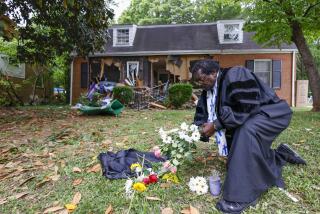Dialysis Patient to Set Off on the Ride of His Life
I have never biked across the U.S. but if I ever do, it won’t be with Bryon Vouga.
The 30-year-old teacher will set out on his 30-day odyssey this morning. He’ll average 100 miles a day, across baking deserts and over towering mountains. He’ll cross Texas in July. Nothing sounds hotter than crossing Texas in July on a bicycle. Yet he’ll plod on, through the stifling humidity of the Deep South, past the teens who throw beer cans and the snarling dogs that leap for cyclists’ calves--another day, another 100 miles, regardless of how bad he might feel.
Vouga is a lot faster than I could ever be, even stopping 14 times on his 2,700-mile trip for the kidney dialysis that keeps him alive.
By the time he dips his front wheel in the Atlantic at Jacksonville, Fla., he will by all accounts be the first dialysis patient to bicycle the continent. Along the way, he will prove that a person with a life-threatening illness can be as joyously crazed and painfully calloused as anyone else who sentences himself to hard time on a bike saddle.
For many men--particularly those teetering on middle age--a serious bike trip is a lighthearted rite of passage, a way of showing the world that despite office politics and impenetrable mission statements and useless strategic plans, the heart still pumps.
But for Vouga, it’s something else. He tried to explain it the other day to some 350 workers at Amgen, the biotechnology giant in Thousand Oaks. He told them he measures his success at work by the successes of the troubled kids he teaches. Likewise, he said, Amgen employees should measure their success by his own.
Amgen is sponsoring his trip. The company makes Epogen, a drug that reduces the life-sapping fatigue of people with kidney diseases as severe as Vouga’s.
“For a time, I was so sick I decided I had to do something to make my life worth it,” Vouga said.
Diagnosed with nephritis at 16, Vouga had his first kidney transplant three years later. It didn’t take, and neither did a second. During college, Vouga was so weak that driving to class left him without enough energy to get out of the car. He couldn’t handle stairs, or carry a bag of groceries from the garage to the kitchen.
His medication, plus dialysis three times a week, changed that. Vouga’s vitality soared. He was strong enough to get his degree in political science from Cal State Fullerton, to enjoy his demanding teaching job in Orange County and, fatefully, to hop on his bike.
Until now, his longest ride was a 200-mile loop from Malibu up to Ventura and into the mountains surrounding Ojai.
But that was just an hors d’oeuvre.
This morning, Vouga will leave Huntington Beach and head into the heat of the Mojave. He’ll ride his high-tech titanium road bike solo, but he won’t be alone; a four-vehicle convoy will accompany him, including his fiancee Heather Driskill, his aunt and uncle, a nurse, and three trouble-shooters from Amgen.
People on such trips usually gorge themselves on dishes selected from the cyclists’ three food groups: pancakes, spaghetti and beer. However, Vouga isn’t certain how he’ll achieve his aim of 5,000 calories a day on his severely restricted diet.
“We’re flying by the seat of our pants,” he said. “Since this has never been done before, nobody knows just what I have to eat.”
What is known is that Vouga must have his blood filtered by dialysis for nearly four hours three times a week. Tests conducted at each center will let his doctors in California know how he’s doing, so they can call the mobile nurse with their recommendations.
The trip is a lot more complicated than the one Vouga had first envisioned. He thought he would camp instead of staying in motels. He didn’t imagine that an Indian group in Arizona would honor him with a ceremonial dance, or that he’d be feted at a barbecue in Baton Rouge. He’ll be doing newspaper and TV interviews along his route--an unanticipated chore--but he says he doesn’t mind the hoopla.
“Now it has the potential to affect a lot of people,” he said. “Originally, I wanted to set a record that would stand a long time. Now I’d love it if a dialysis patient challenged it and beat it.”
But why cross the U.S. on a bicycle? I asked. Because it’s there?
“Because I can,” he said.
Steve Chawkins is a Times staff writer. His e-mail address is steve.chawkins@latimes.com.
More to Read
Start your day right
Sign up for Essential California for news, features and recommendations from the L.A. Times and beyond in your inbox six days a week.
You may occasionally receive promotional content from the Los Angeles Times.







